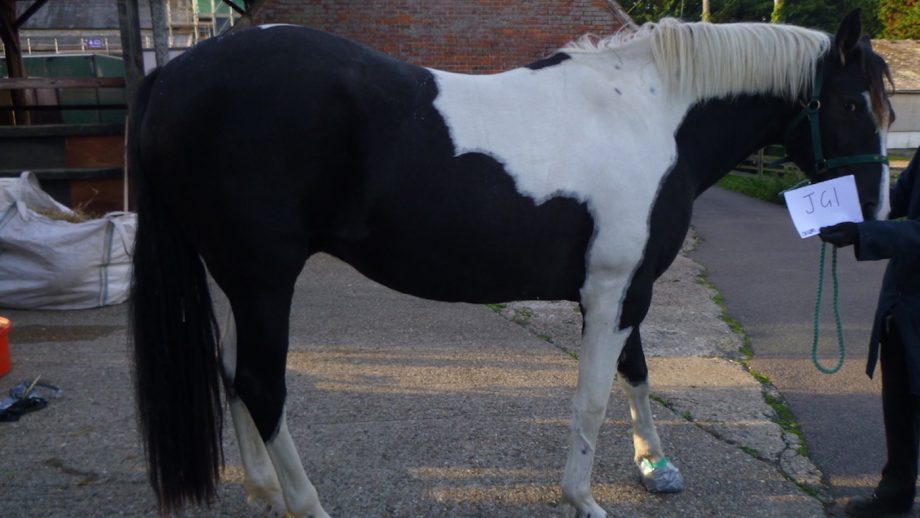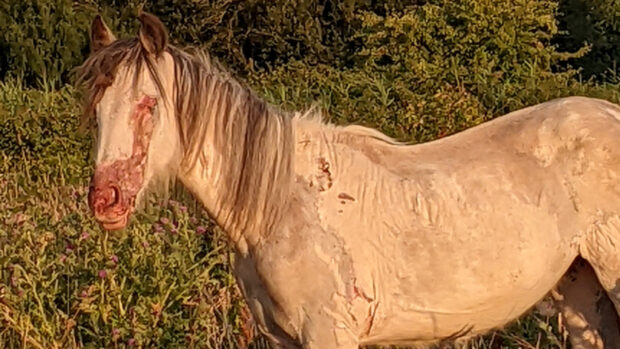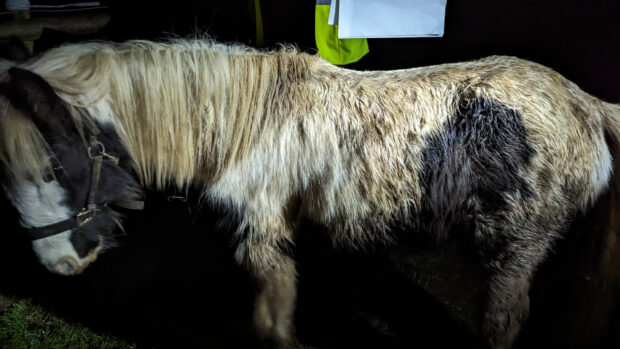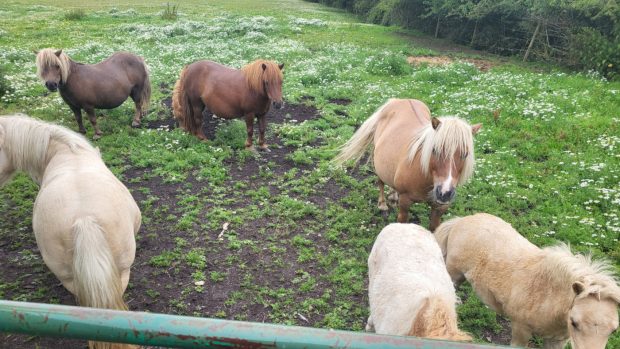A woman who kept starving horses in a “death camp” has been jailed and banned from keeping animals for life.
Annette Nally, 50, of Parkwood Lane, Solihull was found guilty of two charges of causing unnecessary suffering to horses and two charges of failing to take reasonable steps to ensure the needs of horses in her care were met. She was sentenced to 26 weeks in prison when she appeared at Kidderminster Magistrates Court on 6 September following a six-day trial.
At sentencing, judge Ian Strongman said Nally had “earned a reputation for rescuing and caring for horses, particularly retired racing and thoroughbred horses” and that she had worked with charities and organisations to provide safe and happy homes for neglected and retired thoroughbred horses.
A spokesman for the RSPCA said a neighbouring farmer attended Nally’s property at Stokes Prior on 14 July after horses escaped on to his land.
“When the farmer arrived he ushered the horses back into Nally’s field and noticed there appeared to be no food or water for the horses and that they were in a poor condition. He called another neighbour who, when she attended, was shocked by what she found.
“The water trough in the main field was dry, with the water supply cut off at the tap. Most of the horses in that field, who were in direct sunlight and in temperatures in the high 20s, were wearing winter rugs.”
The spokesman for the charity, which attended the property on the same day, said a mare and colt were found in one stable and a stallion called Rocky in another. A barn at the property contained four horses, one of which was dead.
“The other three were in very poor body condition. There was no food or water and the floor was filthy with urine and faeces. Post-mortem examination showed no food in the gut of the dead horse; only string in his intestine,” said the spokesman.
“Another gelding was in very poor condition; he deteriorated shortly afterwards and died. The other two; a filly and a colt, showed marked improvement having been fed hay by the RSPCA for 10 days.”
Judge Strongman said at sentencing the mare found in the stable was “skin and bone”.
“She had to be put down within 24 hours and a post-mortem showed she had died as a result of malnutrition. The colt was in a slightly better condition but was, in any event, grossly underweight,“ he said.
“That horse, having been taken by the RSPCA, dramatically improved its condition within six weeks demonstrating that its poor health was wholly down to a lack of proper care.”
The judge added he had seen a photo of Rocky taken a year earlier.
“It shows him in his glory as a healthy, athletic and well cared-for horse in the peak of condition. He was a showjumper. The same horse in July 2018 in your care was quite literally skin and bone in your stable,” he said.
“He looked a pathetic sight, with his penis prolapsed as a consequence of his weakness. He was wearing a heavy winter rug. He had to be put down.
“The post-mortem report describes how he had no fat on his body and that his muscles had been used by his body as food to keep him alive. In both of these stables the floor was covered in urine and faeces. It stank and there were flies. There was no clean bedding, no food and no water.”
Judge Strongman said members of the public brought containers of water to the site.
“Helpers commented that they could not water the thirsty horses quickly enough. Food supplied by a farmer was eaten enthusiastically by the horses,” he said.
“I have no doubt that, but for the chance intervention by these concerned members of the public, more horses would have died from hunger or thirst.”
The RSPCA attended two other sites under Nally’s control on 16 July and 31 July at Lapworth and Old Green Lane, Solihull.
“At Lapworth officers found a mare and two fillies. They had been in Nally’s care since 2017 and in early 2018 were in good condition. On 16 July 2018 they had very poor body condition and were put to sleep at Nally’s request. Post-mortems found that each horses’ condition was due to starvation,” said the charity spokesman.
“At Old Green Lane four horses were seen with poor body condition, high parasitic worm burdens and hooves in need of long overdue attention.”
Judge Strongman said the horses had been “starved for weeks”.
“None of these horses got into this condition overnight. There was hardly any food for the horses on site and none that the horses could access. It may be that you found you could not afford to buy food. The RSPCA offered help with food several times, but you declined. Had you asked for help, there were plenty of people who would have been happy to help.
“The actions of the concerned members of the public on the day proves that. There can, however, be no excuse for failing to provide water. The tap to the water butt in the field was turned off. There was no water in the stables. This can only be explained by a callous disregard for the welfare of the horses in your care. It would be shocking at any time but especially so during a period of extreme heat such as we had last summer.”
Judge Strongman said Nally criticised the RSPCA during the trial for “letting her down” and pressurising her to take in horses when she had no capacity for them, and blamed the charity for the condition of some of the horses – but he said he found those allegations to be false.
“No such promises were made and no was pressure put on you to accept horses. Offers of help were made by the RSPCA to supply feed for some of the horses they placed with you, but you turned them down. I am entirely satisfied that the RSPCA acted in good faith at all times and offered you proper support,” he said.
Judge Strongman said an aggravating factor in this case was “the gross breach of trust” and said members of the public and animal welfare charities placed horses in Nally’s care in the expectation that they would be given a safe, secure and happy home.
“What you provided in the weeks prior to the intervention of the RSPCA was something more akin to a death camp. The number of horses affected and the desperate state in which they were found must make this one of the most serious cases of its type,” he said.
“The only mitigating factor is your previous good character, but that must be balanced against the gross breach of trust and the sheer scale and extent of your deliberate neglect of these horses. It is rare that a case calls for the maximum sentence. That must be reserved for the most extreme examples of their kind. I am satisfied your case fits that criteria. I am sure many animal lovers and right-minded people will think my sentence too lenient, but it is the maximum the law enables me to impose.”
In mitigation the court heard Nally had damaged her ribs three weeks prior to the 14 July.
The RSPCA spokesman said the charity welcomed the outcome of this case.
“These animals suffered in her care and, as the judge said, she saw animals deteriorate in front of her and did absolutely nothing to stop it. Caring for horses is a huge responsibility. Providing food and water, alongside regular and routine farriery care, is vital,” he said.
Article continued below…

Farrier caught on CCTV carrying out ‘violent’ attack on horse
The court said the man can continue to work as a farrier, but must be supervised by an adult at

Indefinite ban for woman who failed to seek treatment for horse’s foot abscess
‘Had the owner sought veterinary care earlier then his suffering could have been easily prevented’

Subscribe to Horse & Hound magazine today – and enjoy unlimited website access all year round
“Those caring for animals also have a legal responsibility to seek veterinary treatment for animals when they require it. It is never acceptable to leave an animal to suffer.”
Nally was ordered to pay £115 victim surcharge.
The RSPCA spokesman said Nally is appealing her conviction.
For all the latest news analysis, competition reports, interviews, features and much more, don’t miss Horse & Hound magazine, on sale every Thursday.





